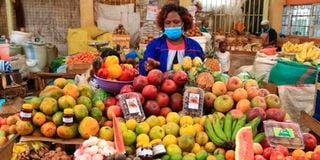More Kenyans now project pain from higher commodity prices

Gladys Muringi, a vendor in Nyeri town, sells fruits. More Kenyans now expect commodity prices to squeeze their budgets, reversing earlier expectations.
More Kenyans now expect commodity prices to squeeze their budgets this month, a survey by the Central Bank of Kenya (CBK) shows, reversing earlier expectations.
The survey cited high prices for key food items, including sugar and maize as one of the reasons most Kenyans have lost hope in food prices coming down.
"During the May survey, respondents who were expecting inflation to decrease within a month were 25.5 percent, in the survey for June, they had declined to 11.1 percent. Similarly, respondents who were expecting inflation to decrease within three months reduced from 43.8 percent to 26.4 percent," said CBK governor Kamau Thugge.
He said the apex bank's Monetary Policy Committee (MPC), which met on Monday, took the concerns seriously and decided to raise the Central Bank Rate (CBR) by one percentage point, the highest rate since the regulator started tightening monetary policy last year, to counter inflation.
"Those who expect inflation to rise in the next one month have increased from 44.4 percent to 61.1 percent and those expecting it to increase over the next three months have increased from 42/5 percent to 54.2 percent," said Dr Thugge.
Also Read: More Kenyans fail to pay back loans
While the MPC's action will raise the pricing of loans, worsening the cost of living amid high commodity prices, the CBK governor said the raise was "so that people don't make decisions while expecting inflation to rise".
The MPC met on June 26, barely a month after it met on May 29 under former governor Patrick Njoroge. Dr Thugge said the meeting, unusual from MPC's bi-monthly meetings, was because the previous one wrongly projected the inflation trends.
An internal MPC projection in May was that inflation would drop from 7.9 percent in April to 7.1 percent in May, but inflation ended at eight percent.
But CBK projects positive growth in the agricultural sector this year, with maize, beans, potatoes, and wheat production expected to increase and bring down food prices.
"We expect maize to increase quite significantly compared to the contraction in 2022. We also expect wheat, Irish potatoes, and beans to increase. We only see a reduction in the production of rice. Rice production is expected to decline in 2023 relative to 2022 due to floods in the Ahero Irrigation Scheme, competing cheaper imports, and pests, and diseases," said Dr Thugge.





